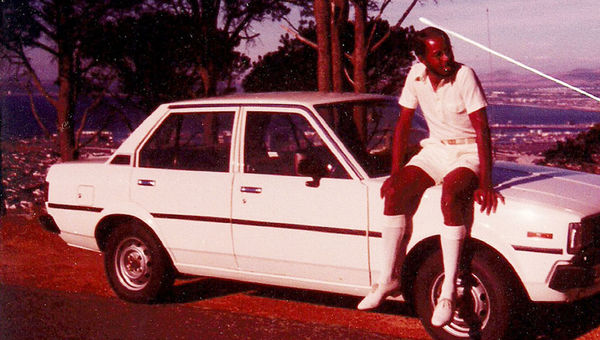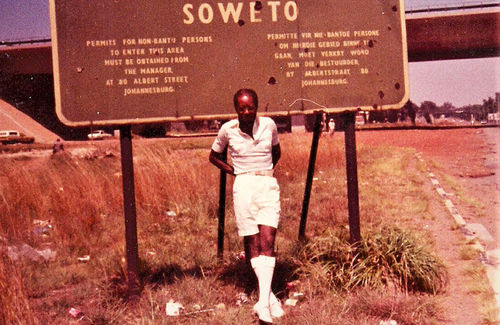
Arnie Weissmann
As an executive at Pepsi, J.R. Harris was responsible for market research in 56 countries and traveled extensively for work. And after he quit in 1975 to start his own market research company, his clientele remained primarily international.
Like most road warriors, business travel was hardly a passion; on the other hand, he loved to hike, solo, in remote areas. Seldom did he simply travel as an ordinary leisure tourist, but when we were talking earlier this month, he told me about a time that he had.
"I went to South Africa in 1982 as a tourist," he said.
That in itself would have been somewhat interesting; apartheid was the law of the land then. What made it especially interesting is that Harris is Black.
"Everyone had an opinion about it," he said. "But it occurred to me that if I really wanted to know what it was like, I should go there."
He applied for a tourist visa at the consulate in New York. The consular officers seemed incredulous that a Black man would apply for a tourist visa and weren't quite sure what to do. They told him to have a seat.

J.R. Harris, with his rented car, in Cape Town, circa 1982. Though frequently stopped by the police, his status as an “honorary white person” made the stops uneventful. Photo Credit: Courtesy of Thelma Ngcobo
Others who came in after him were being called ahead of him. "Finally, I went up and said, 'What's the story? I've been here half the afternoon.'"
"We've never had a Black person who wanted to go to South Africa as a tourist," the woman at the desk told him. "We had to call Johannesburg to see if was OK, but we just learned the office is closed. Come back tomorrow."
He did. And the next day, he got his visa. "But they still looked at me like I was some kind of crazy person," he said.
They also explained the rules: Because he had an American passport, he would not be subject to the restrictions that applied to Black South Africans. They gave him a document that would, he told me, "officially make me an honorary white person. I've been called a lot of things in my life, but never that."
There was one restriction he would have to pay attention to, they continued. Restaurants had a star rating system, and any five-star restaurant, the top level, would seat him. But if an owner voluntarily dropped down to four stars, they'd retain the right to refuse him service.
Armed with his visa and document, he bought a ticket on South African Airways -- first class. He was already settling in when his seatmate boarded. "'Oh no, no, no, no,' the guy said when he saw me," Harris said. "'I'm not going to sit next to him. I want another seat.'"
But there were none available in first class, the flight attendant explained. The only alternative would be to sit in coach. "Well, I'm not going to sit here," the man said, and he took his carry-on out of the overhead bin and walked back to coach -- with shows of support from the other white people in first class.

Harris also visited the segregated Black township of Soweto, Johannesburg. Photo Credit: Courtesy of Thelma Ngcobo
Undaunted, Harris spent about two weeks touring the country, from the townships of Soweto to Sun City to the wine country. Atop Table Mountain in Cape Town, he looked down at Robben Island, where Nelson Mandela was then imprisoned. He even visited the Voortrekker Monument in Pretoria to better understand the Boer culture of the people who established apartheid.
In his rented car, he drove to Cape Agulhas so he could be the southernmost human in Africa, a bookend to his first solo trip when, fresh out of college, he drove to the northernmost point of Alaska so that no car would be between his and the North Pole.
When he was in smaller towns in South Africa where there were no five-star restaurants, there were occasions when he was told he couldn't be served but that he could buy food to eat in his car. "They were always polite, making a point to say they were not the owners," Harris said.
His car was stopped by the police multiple times, but his "honorary white" status made the stops brief and uneventful, he said.
None of his experiences came close to the frustration he felt when, still in high school, he made his first trip to the segregated American South, to visit friends in South Carolina. On the train on the way back, the conductor, who was Black, told him he'd have to stand rather than be seated. "There's a white man sleeping in your seat, and I'm not going to wake him up," he was told.
Harris asked how long the interloper was going to be on the train. "He's going to Washington, D.C." -- eight hours down the line -- was the reply.
Generally speaking, Harris said, he feels welcome wherever he goes.
"I was born restless, I was born curious," he said. "The only times I truly don't feel welcome is when I'm hiking in grizzly country."